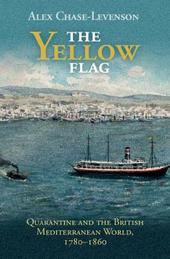
|
The Yellow Flag: Quarantine and the British Mediterranean World, 1780-1860
Hardback
Main Details
| Title |
The Yellow Flag: Quarantine and the British Mediterranean World, 1780-1860
|
| Authors and Contributors |
By (author) Alex Chase-Levenson
|
| Series | Global Health Histories |
|---|
| Physical Properties |
| Format:Hardback | | Pages:318 | | Dimensions(mm): Height 235,Width 159 |
|
| ISBN/Barcode |
9781108485548
|
| Classifications | Dewey:614.460941 |
|---|
| Audience | | Professional & Vocational | |
|---|
| Illustrations |
Worked examples or Exercises; 20 Halftones, black and white; 3 Line drawings, black and white
|
|
Publishing Details |
| Publisher |
Cambridge University Press
|
| Imprint |
Cambridge University Press
|
| Publication Date |
16 April 2020 |
| Publication Country |
United Kingdom
|
Description
Until the middle of the nineteenth century, quarantine laws in all Western European nations mandated the detention of every inbound trader, traveller, soldier, sailor, merchant, missionary, letter, and trade good arriving from the Ottoman Empire and North Africa. Most of these quarantines occurred in large, ominous fortresses in Mediterranean port cities. Alex Chase-Levenson examines Britain's engagement with this Mediterranean border regime from multiple angles. He explores how quarantine practice laid the foundations for the state provision of public health and constituted an early example of European integration. Situated at the intersection of political, cultural, diplomatic, and medical history, The Yellow Flag captures the texture of quarantine as an experience, its power as an administrative precedent, and its novelty as an example of a continental border built from the ground up by low-level bureaucrats.
Author Biography
Alex Chase-Levenson is Assistant Professor of History at the University of Pennsylvania.
Reviews'A refreshingly original look at a phenomenon historians have chronically misunderstood. Imaginative and vivid, The Yellow Flag uses exhaustive archival research to breathe life into centuries-old policies and debates. The book is about more than just quarantine; it delves deeply into one of the great questions of the nineteenth century - and indeed of our own age: what are the responsibilities of the modern state?' David Barnes, University of Pennsylvania 'A new history of the Mediterranean, a new history of early nineteenth-century Britain, and a new history of quarantine. Chase-Levenson has delivered all three in this spectacular study. In those strange and charged places, Mediterranean lazarettos, he shows us how 'east' and 'west' were demarcated. A major contribution.' Alison Bashford, University of New South Wales 'Chase-Levenson's rich transnational history of Mediterranean quarantine powerfully illuminates the early 19th century significance of plague and other epidemics for the construction of a 'European biopolity', the consolidation of quarantine as a system reciprocally binding Britain and its European Mediterranean trading partners, and the oft-times parochial history of English public health.' James Hanley, University of Winnipeg '... the book provides the most comprehensive approach to the history of quarantine and proves to be an enjoyable and important reading to anyone interested in the history of epidemics, preventative medicine and the history of the Mediterranean.' Marina Ini, Social History of Medicine 'The Yellow Flag: Quarantine and the British Mediterranean World, 1780-1860 is a timely book ... numerous scholars and students will find Chase-Levenson's work interesting and useful from political, medical, and maritime perspectives.' Sarah E. Naramore, Book Reviews (www.globalmaritimehistory.com) 'In this imaginative work, Chase-Levenson (Univ. of Pennsylvania) skillfully argues that quarantine was not some antiquated system but rather a modern tool Britain employed to protect its subjects and trade networks ... will interest scholars of Britain and Europe and those interested in empire, maritime history, global trade, globalization, and the history of health and medicine.' J. Rankin, Choice 'The Yellow Flag will reward readers interested in the history of health, diplomacy, and travel in the Mediterranean and beyond.' Kathleen Frederickson, Victorian Studies
|